| Listing 1 - 7 of 7 |
Sort by
|
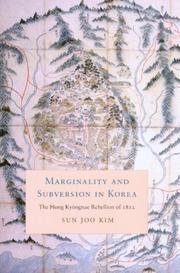
ISBN: 9780295986845 0295986840 9780295989310 0295989319 029580338X 9780295803388 Year: 2007 Publisher: Seattle: University of Washington press,
Abstract | Keywords | Export | Availability | Bookmark
 Loading...
Loading...Choose an application
- Reference Manager
- EndNote
- RefWorks (Direct export to RefWorks)
Hong Kyong-nae Incident, 1811-1812 --- Korea --- History --- K9155 --- K9300.50 --- K9309 --- Korea: History -- late Chosŏn period, isolation, Qing dependency (1600-1895), Manchu invasions (1627, 1637) --- Korea: Social sciences -- social and cultural history -- Chosŏn period (1392-1910) --- Korea: Social sciences, society -- social theory, movements and protests --- Hong Kyŏng-nae Incident, 1811-1812 --- Korea - History - 1637-1864 --- Hong Kyŏng-nae Incident, 1811-1812.
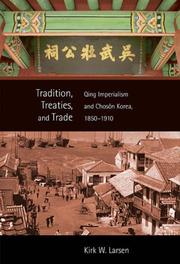
ISBN: 9780674028074 0674028074 Year: 2008 Volume: 295 Publisher: Cambridge (Mass.): Harvard University Asia Center,
Abstract | Keywords | Export | Availability | Bookmark
 Loading...
Loading...Choose an application
- Reference Manager
- EndNote
- RefWorks (Direct export to RefWorks)
Korea --- China --- Corée --- Chine --- Foreign relations --- Relations extérieures --- S09/0411 --- K9155 --- K9161 --- K9551.14 --- China: Foreign relations and world politics--China and Korea --- Korea: History -- late Chosŏn period, isolation, Qing dependency (1600-1895), Manchu invasions (1627, 1637) --- Korea: History -- Western intervention and opening of Korea (1860s-1910) --- Korea: International politics, law and relations -- Asia -- China --- Corée --- Relations extérieures --- Korea - Foreign relations - China --- China - Foreign relations - Korea --- Korea - Foreign relations - 1864-1910 --- China - Foreign relations - 1644-1912
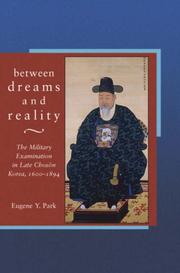
ISBN: 9780674025028 0674025024 1684174511 9781684174515 Year: 2007 Volume: 281 Publisher: Cambridge: Harvard university press,
Abstract | Keywords | Export | Availability | Bookmark
 Loading...
Loading...Choose an application
- Reference Manager
- EndNote
- RefWorks (Direct export to RefWorks)
Military education --- Sociology, Military --- History --- Korea --- Armed Forces --- Examinations --- -Sociology, Military --- -K9570 --- K9570 --- K9324.20 --- K9155 --- Military sociology --- Armies --- Peace --- War --- War and society --- Army schools --- Education, Military --- Military art and science --- Military schools --- Military training --- Schools, Military --- Education --- -Korea: Defense and military -- general and history --- Korea: Defense and military -- general and history --- Korea: Communities, social classes and groups -- military --- Korea: History -- late Chosŏn period, isolation, Qing dependency (1600-1895), Manchu invasions (1627, 1637) --- Study and teaching --- Armed forces --- -Examination --- -History. --- Choson dynasty, 1392-1910. --- History. --- Military education --- Sociology, Military --- Military education - Korea - History --- Sociology, Military - Korea - History - 1392-1910 --- Korea - Armed Forces - Examinations - History --- Korea - History - Choson dynasty, 1392-1910
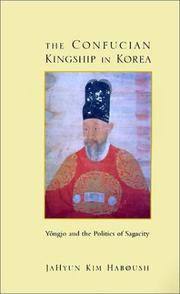
ISBN: 0231066562 0231066570 9780231066570 9780231066563 Year: 1988 Publisher: New York Columbia university press
Abstract | Keywords | Export | Availability | Bookmark
 Loading...
Loading...Choose an application
- Reference Manager
- EndNote
- RefWorks (Direct export to RefWorks)
K9155 --- K9150 --- K9040 --- K9030.50 --- K9125.50 --- Korea: History -- late Chosŏn period, isolation, Qing dependency (1600-1895), Manchu invasions (1627, 1637) --- Korea: History -- Chosŏn period (1392-1910) --- Korea: Philosophy and thought -- schools -- Confucianism --- Korea: Philosophy and thought -- history -- Chosŏn period (1392-1910) --- Korea: Genealogy and biography -- biography -- Chosŏn period (1392-1910) --- Yongjo King of Korea --- K9500.50 --- Confucianism and states --- -Korea: Politics -- theory, methodology and philosophy --- Korea: Politics -- history -- Chosŏn period (1392-1910) --- Jŏngjo, King of Korea, 1694-1776 --- Confucianisme. --- Yŏngjo, --- Koningen (vorsten). --- Confucianism and state --- State and Confucianism --- State, The --- Yŏngjo, --- Yi Yŏngjo, --- 英祖, --- 영조, --- K9509 --- Korea --- Kings and rulers. --- Politics and government --- -Jŏngjo, King of Korea, 1694-1776
Book
ISBN: 9780295993126 9780295993133 9780295804965 0295804963 029599312X 0295993138 Year: 2014 Publisher: Seattle
Abstract | Keywords | Export | Availability | Bookmark
 Loading...
Loading...Choose an application
- Reference Manager
- EndNote
- RefWorks (Direct export to RefWorks)
"This collection presents and analyzes inquest records that tell the stories of ordinary Korean people under the Chosŏn court (1392-1910). Extending the study of this period, usually limited to elites, into the realm of everyday life, each inquest record includes a detailed postmortem examination and features testimony from everyone directly or indirectly related to the incident. The result is an amazingly vivid, colloquial account of the vibrant, multifaceted societal and legal cultures of early modern Korea. Sun Joo Kim is the Harvard-Yenching Professor of Korean History at Harvard University. Jungwon Kim is assistant professor of Korean history at Columbia University; 'This book provides an extremely rare view into social interactions among people of quite different classes in Chosŏn Korea. Points of interest abound'--Robert E. Hegel, Washington University, St. Louis; 'This is an important contribution that significantly advances our knowledge of nineteenth-century Korean legal history. The translated cases shine by being able to introduce daily struggles of non-elites and illustrate the complex dynamics of the judiciary system during the last century of the Chosŏn dynasty'--Jisoo Kim, George Washington University"--
Court records --- Courts --- Law --- Social classes --- Wrongful death --- K9155 --- K9300.50 --- K9580 --- Records of court --- Archives --- Evidence (Law) --- Public records --- Death by wrongful act --- Homicide --- Torts --- Class distinction --- Classes, Social --- Rank --- Caste --- Estates (Social orders) --- Social status --- Class consciousness --- Classism --- Social stratification --- Acts, Legislative --- Enactments, Legislative --- Laws (Statutes) --- Legislative acts --- Legislative enactments --- Jurisprudence --- Legislation --- Judiciary --- Dispute resolution (Law) --- Judicial districts --- Procedure (Law) --- Judicial power --- Jurisdiction --- Justice, Administration of --- History --- Social aspects --- Korea: History -- late Chosŏn period, isolation, Qing dependency (1600-1895), Manchu invasions (1627, 1637) --- Korea: Social sciences -- social and cultural history -- Chosŏn period (1392-1910) --- Korea: Law and jurisprudence -- general and history --- Law and legislation --- Korea --- Social conditions
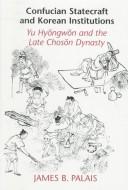
ISBN: 0295805110 0295974192 9780295805115 9780295993782 9780295974552 0295974559 0295993782 Year: 2014 Publisher: Seattle
Abstract | Keywords | Export | Availability | Bookmark
 Loading...
Loading...Choose an application
- Reference Manager
- EndNote
- RefWorks (Direct export to RefWorks)
Seventeenth-century Korea was a country in crisis--successive invasions by Hideyoshi and the Manchus had rocked the Chosòn dynasty (1392-1910), which already was weakened by maladministration, internecine bureaucratic factionalism, unfair taxation, concentration of wealth, military problems, and other ills. Yu Hyòngwòn (1622-1673, pen name, Pan'gye), a recluse scholar, responded to this time of chaos and uncertainty by writing his modestly titled Pan'gye surok (The Jottings of Pan'gye), a virtual encyclopedia of Confucian statecraft, designed to support his plan for a revived and reformed Korean system of government. Although Yu was ignored in his own time by all but a few admirers and disciples, his ideas became prominent by the mid-eighteenth century as discussions were underway to solve problems in taxation, military service, and commercial activity. Yu has been viewed by Korean and Japanese scholars as a forerunner of modernization, but in Confucian Statecraft and Korean Institutions James B. Palais challenges this view, demonstrating that Yu was instead an outstanding example of the premodern tradition. Palais uses Yu Hyòngwòn's mammoth, pivotal text to examine the development and shape of the major institutions of Chosòn dynasty Korea. He has included a thorough treatment of the many Chinese classical and historical texts that Yu used as well as the available Korean primary sources and Korean and Japanese secondary scholarship. Palais traces the history of each of Yu's subjects from the beginning of the dynasty and pursues developments through the eighteenth and nineteenth centuries. He stresses both the classical and historical roots of Yu's reform ideas and analyzes the nature and degree of proto-capitalistic changes, such as the use of metallic currency, the introduction of wage labor into the agrarian economy, the development of unregulated commercial activity, and the appearance of industries with more differentiation of labor. Because it contains much comparative material, Confucian Statecraft and Korean Institutions will be of interest to scholars of China and Japan, as well as to Korea specialists. It also has much to say to scholars of agrarian society, slavery, landholding systems, bureaucracy, and developing economies.
Sirhak school. --- Confucianism and state --- State and Confucianism --- State, The --- Silhak --- Silhakʾpa --- Philosophy, Korean --- Yu, Hyŏng-wŏn, --- Korea --- Politics and government --- -Sirhak school --- K9500.50 --- K9040 --- K9030.50 --- K9155 --- K9150 --- K9125.50 --- Korea: Politics -- history -- Chosŏn period (1392-1910) --- Korea: Philosophy and thought -- schools -- Confucianism --- Korea: Philosophy and thought -- history -- Chosŏn period (1392-1910) --- Korea: History -- late Chosŏn period, isolation, Qing dependency (1600-1895), Manchu invasions (1627, 1637) --- Korea: History -- Chosŏn period (1392-1910) --- Korea: Genealogy and biography -- biography -- Chosŏn period (1392-1910) --- Yu, Hyong-won --- -Sirhak school. --- -Confucianism and state
Book
ISBN: 9780231172288 9780231540988 0231540981 0231172281 Year: 2016 Publisher: New York ; Chichester Columbia University Press
Abstract | Keywords | Export | Availability | Bookmark
 Loading...
Loading...Choose an application
- Reference Manager
- EndNote
- RefWorks (Direct export to RefWorks)
"JaHyun Kim Haboush argues that beginning with the outbreak of the Imjin War, when Japan invaded Korea in 1592, a discourse of nation emerged in Chosôn Korea (1392-1910) which continued, in a variety of forms, until the modern era. This is the first book to examine the formation of the Korean nation before the modern era. The Imjin War and the rise of the Manchu were events of monumental importance in East Asian history. The Great East Asian War escalated into a six-year regional war in which the three East Asian countries, Japan, Korea and China, fought either as allies or enemies, with a commitment of large forces, fighting on sea and land. This conflict was by far the largest war known to the world in the sixteenth century. In East Asian memory, it remained unequalled in scale until the Second World War. In Korea the Chosôn dynasty began in 1392 and persisted until 1910, and within this dynasty an idea of nation emerged and circulated. This discourse of nation shifted and intensified after the Manchu invasion in 1636. Haboush shows how this process was a visible, traceable, and documented phenomenon. The idea of a sixteenth century Korean nation is also unfamiliar in Korea. Nationalism for the most part is presented as a preexisting condition in the Imjin War, though 'strengthened' and 'heightened' by the experience. Scholars of the modernist camp subscribe to the historicism of Western historiography. They present the nationhood of Korea as a narrative of transformation, locating its arrival in the modern period, sometime in late 19th or early 20th century, under the auspices of new ideologies and visions from the West"--Provided by publisher.
Nationalism --- War and society --- Society and war --- War --- Sociology --- Civilians in war --- Sociology, Military --- Consciousness, National --- Identity, National --- National consciousness --- National identity --- International relations --- Patriotism --- Political science --- Autonomy and independence movements --- Internationalism --- Political messianism --- History --- Social aspects --- Japanese Invasions of Korea (1592-1598) --- Manchu Invasions of Korea (1627-1637) --- Korea --- East Asia --- Asia, East --- Asia, Eastern --- East (Far East) --- Eastern Asia --- Far East --- Orient --- Influence. --- History, Military --- K9154 --- K9155 --- K9300.50 --- K9310.20 --- Korea: History -- Chosŏn period -- Japanese invasion, Imjin war (1592-1598) --- Korea: History -- late Chosŏn period, isolation, Qing dependency (1600-1895), Manchu invasions (1627, 1637) --- Korea: Social sciences -- social and cultural history -- Chosŏn period (1392-1910) --- Korea: Society, social psychology and social-anthropological phenomena (South) Korea -- nationalism
| Listing 1 - 7 of 7 |
Sort by
|

 Search
Search Feedback
Feedback About UniCat
About UniCat  Help
Help News
News